Odisha State Board CHSE Odisha Class 11 Math Solutions Chapter 9 Binomial Theorem Ex 9(b) Textbook Exercise Questions and Answers.
CHSE Odisha Class 11 Math Solutions Chapter 9 Binomial Theorem Exercise 9(b)
Question 1.
2nC0 + 2nC2 + …… + 2nC2n = 22n-1 and 2nC1 + 2nC3 + ….. + 2nC2n-1 = 22n-1
Solution:
We know that
(1 + x)2n = 2nC0 + 2nC1x + 2nC2x2 + …..+ 2nC2nxn …(1)
Putting x = 1
We get putting x = – 1 we get
∴ (2nC0 + 2nC2 + 2nC4 + ….. + 2nC2n) – (2nC1 + 2nC3 + ….. + 2nC2n-1) = 0
∴ 2nC0 + 2nC2 + ….. + 2nC2n
= 2nC1 + 2nC3 + ….. + 2nC2n-1
= \(\frac{2^{2 n}}{2}\) = 22n-1
Question 2.
Find the sum of
(i) C1 + 2C2 + 3C3 + ….. + nCn
Solution:
C1 + 2C2 + 3C3 + ….. + nCn
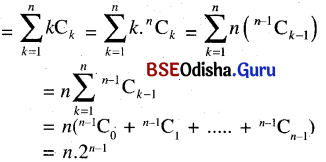
(ii) C0 + 2C1 + 3C2 + ….. + (n+1)Cn Hint: write (C0 + C1 + ….. + Cn) + (C1 + 2C2 + ….. + nCn) use (5) and exercise 1.
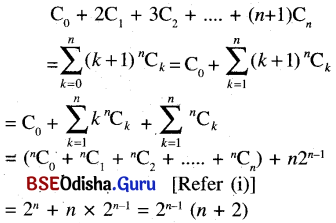
Question 3.
Compute \(\frac{(1+k)\left(1+\frac{k}{2}\right) \ldots\left(1+\frac{k}{n}\right)}{(1+n)\left(1+\frac{n}{2}\right) \ldots\left(1+\frac{n}{k}\right)}\)
Solution:
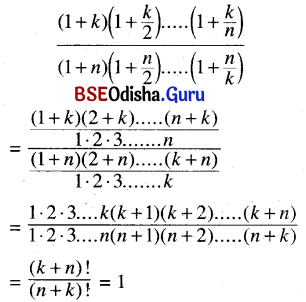
![]()
Question 4.
Show that
(i) C0C1 + C1C2 + C2C3 + ….. + Cn-1Cn = \(\frac{(2 n) !}{(n-1) !(n+1) !}\)
Solution:
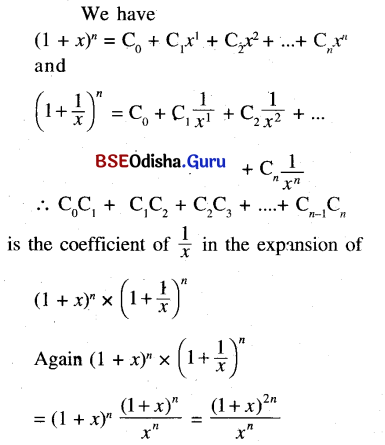
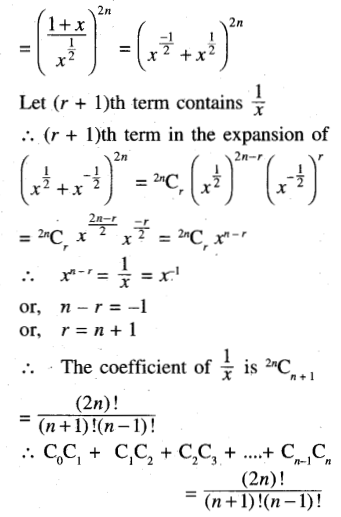
(ii) C0Cr + C1Cr+1 + C2Cr+2 + ….. + Cn-rCn = \(\frac{(2 n) !}{(n-r) !(n+r) !}\) Hint : Proceed as in Example 13. Compare the coefficient of an-1 to get (i) and the coefficient of an-r to get (ii)
Solution:
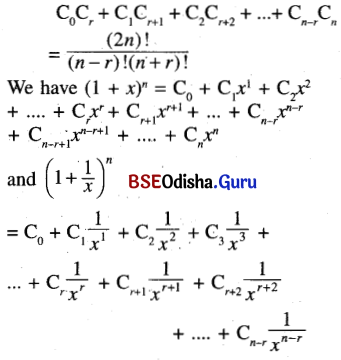
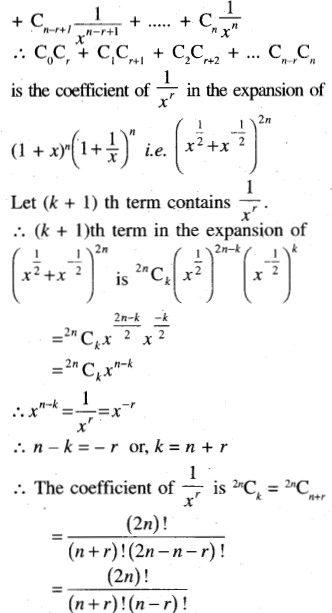
∴ C0Cr + C1Cr+1 + C2Cr+2 + ….. + Cn-rCn = \(\frac{(2 n) !}{(n-r) !(n+r) !}\)
(iii) 3C0 – 8C1 + 13C2 – 18C3 + ….. + (n+1)th term = 0
Solution:
3C0 – 8C1 + 13C2 – 18C3 + ….. + (n+1)th term
= 3C0 – (5 + 3)C1 + (10 + 3) C2 – (15 + 3) C3 + …
= 3(C0 – C1 + C2 …) + 5 (- C1 + 2C2 – 3C3 …..)
But (1 – x)n =C0 – C1x + C2x2 – C3x3 + … + (-1)n xnCn … (1)
Putting x = 1 we get
C0 – C1 + C2 ….. + (-1)nCn
and differentiating (1) we get n(1 – x)n-1 (- 1)
= – C1 + 2C2x – 3C3x2 +…..
Putting x = 1 we get
– C1 + 2C2 – 3C3 + ….. = 0
∴ 3C0 – 8C1 +13C2 …… (n+1) terms = 0
(iv) C0n2 + C1(2 – n)2 +C2(4 – n)2 + ….. + Cn(2n – n)2 = n.2n
Solution:
C0n2 + C1(2 – n)2 +C2(4 – n)2 + ….. + Cn(2n – n)2 = n.2n
= n2(C0 + C1 + + Cn) + (22C1 + 42C2 + ….. + (2n)2Cn) – 4n (C1 + 2C2 + 3C3 + ….+ nCn)
= n2 . 2n + 4n(n+l)2n-2 – 4 n . n . 2n-1
= 2n-1 (2n2 + 2n2 + 2n – 4n2)
= 2n . 2n-1 = n2n
(v) C0 – 2C1 +3C2 + ….. + (-1)n(n+1)Cn = 0
Solution:
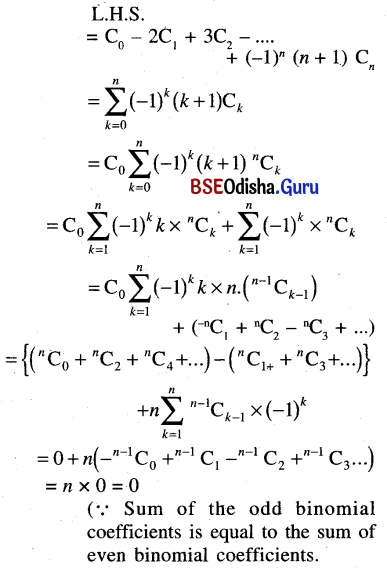
(vi) C0 – 3C1 +5C2 + ….. + (2n+1)Cn = (n+1)2n
Solution:
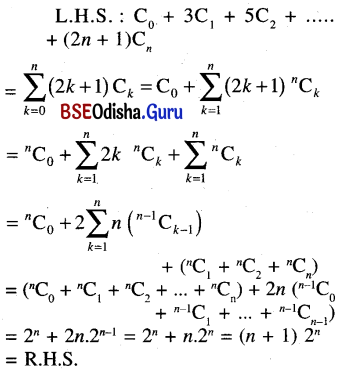
Question 5.
Find the sum of the following :
(i) C1 – 2C2 + 3C3 + ….. + n(-1)n-1Cn
Solution:
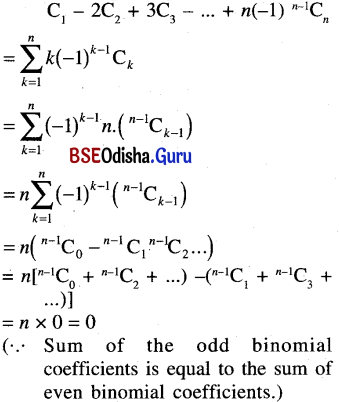
(ii) 1.2C2 + 2.3C3 + ….. + (n-1)nCn
Solution:
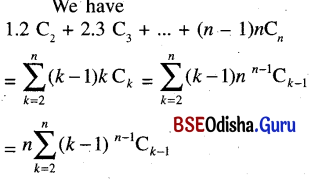
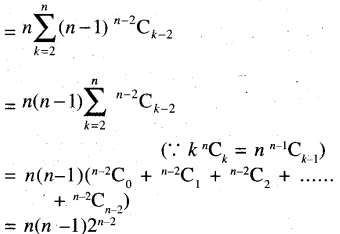
(iii) C1 + 22C2 + 32C3 + ….. + n2Cn
Solution:
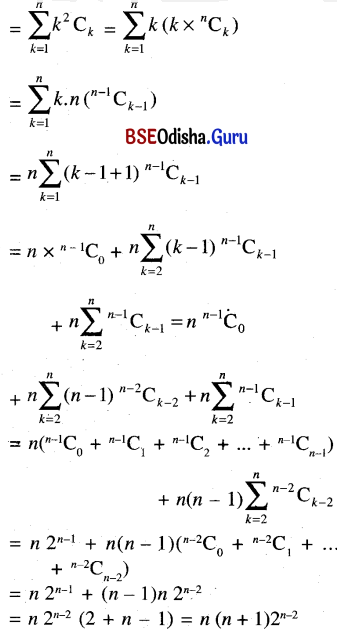
(vi) C0 – \(\frac{1}{2}\)C1 + \(\frac{1}{3}\)C2 + ….. + (-1)n \(\frac{1}{n+1}\)Cn
Solution:
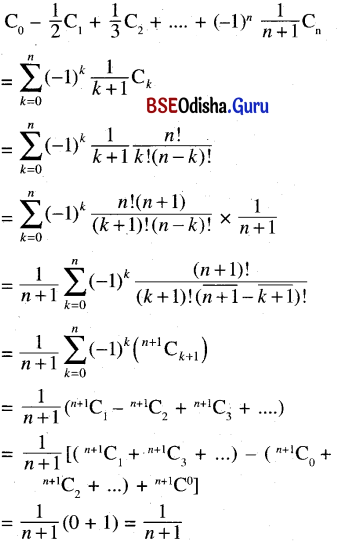
![]()
Question 6.
Show that
(i) C12 + 2C22 +3C32 + ….. + nCn2 = \(\frac{(2 n-1) !}{\{(n-1) !\}^2}\)
Solution:
(ii) C2 + 2C3 + 3C4 + ….. + (n – 1)Cn = 1 + (n – 2)2n-1
Solution:
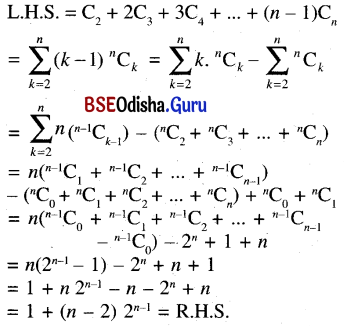
Question 7.
C1 – \(\frac{1}{2}\)C2 + \(\frac{1}{3}\)C3 + ….. +(-1)n+1 \(\frac{1}{n}\)Cn = 1 + \(\frac{1}{2}\) + …. + \(\frac{1}{n}\)
Solution:
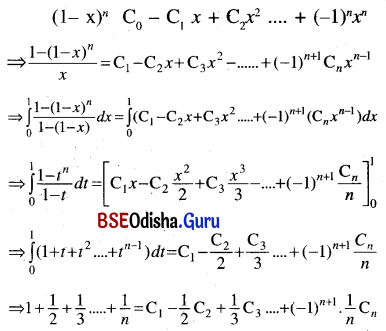
Question 8.
C0C1 + C1C2 + ….. + Cn-1Cn = \(\frac{2^n \cdot n \cdot 1 \cdot 3 \cdot 5 \ldots(2 n-1)}{(n+1)}\)
Solution:
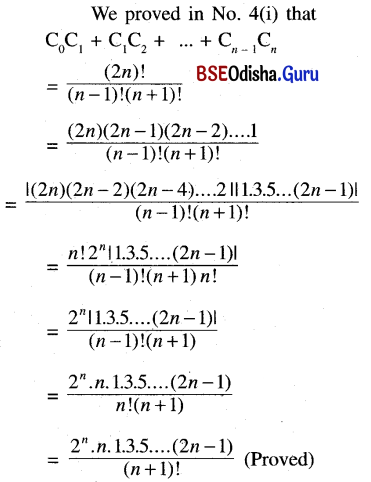
Question 9.
The sum \(\frac{1}{1 ! 9 !}+\frac{1}{3 ! 7 !}+\ldots+\frac{1}{7 ! 3 !}+\frac{1}{9 ! 1 !}\) can be written in the form \(\frac{2^a}{b !}\) find a and b.
Solution:
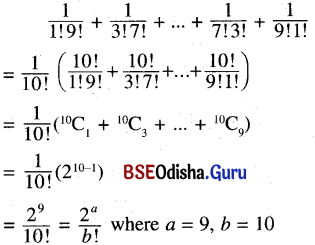
Question 10.
(a) Using binominal theorem show that 199 + 299 + 399 + 499 + 599 is divisible by 5 (Regional Mathematical Olympiad, Orissa – 1987)
Solution:
199 + 299 + 399 + 499 + 599
= 1 + (5 – 3)99 + 399 + (5 – 1)99 + 599
= 1 + (599 – 99C1598.31 + 99C2597.32 – …399) + 399 – (1 – 99C151 + 99C252 – … 599) + 599
= (3 × 599 – 99C1598.31 + 99C2597.32 – ….. + 99C9851.398) + (99C151 – 99C252 + …. – 99C98598) ….(1) which is divisible by 5 as each term is a multiple of 5.
(b) Using the same procedure show that 199 + 299 + 399 + 499 + 599 is also divisible by 3 so that it is actually divisible by 15.
Solution:
From Eqn. (1) above, it is clear that each term within the 1st bracket is divisible by 3 and the terms in the 2nd bracket are divisible by 99 and hence divisible by 3.
Each term in Eqn. (1) is divisible by 3. As it is divisible by 3 and 5, it is divisible by 3 × 5 = 15
